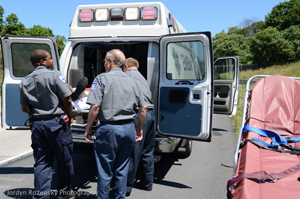Esther Pinsky of Somerville, Massachusetts asks: I’m an EMT (emergency medical technician), and my company is short staffed on Saturdays. When the company is short staffed, patients don’t receive the best of care and emergency response times go up. Not working on Shabbat is a mitzvah, but so is healing the sick, and even in Israel someone has to man the ambulances on Shabbat. Can I pick up shifts on Saturday if they’re desperate, or is that dishonoring the Sabbath?

Judaism teaches that every human being is sacred and created in the image of God, b’tzelem e-lohim. As a result, we cannot “stand idly by the blood of our neighbor” (Leviticus 19:16) and must get involved when our actions would lead to saving a life. However, the Jewish people are also obligated to remember, protect and celebrate Shabbat. Throughout history, many rabbis have made it clear that saving a life supersedes the observance of Shabbat and even criticize those who, out of religious piety, chose not to get involved when a life is at stake. However, the injunction to “save a life” does not give doctors, EMTs or other health care professionals carte blanche to freely ignore Shabbat. Remember, the permission to “dishonor” Shabbat comes from knowing that your actions will save a life.
The ideal solution, if possible, would be to try to trade shifts with other EMTs who are not required to observe Shabbat. However, if no one else is available, and indeed, your presence will improve the care and likelihood of patient survival, then you are permitted to take the shifts.
Reb Moshe Feinstein, arguably the most authoritative decider of Jewish Law in the 20th century, permitted doctors who worked on Shabbat and were summoned by phone or pager while on call to pick up the phone, even if it was most likely not a life and death emergency, on the off chance that it could have been. What’s more, Reb Moshe permitted doctors to use elevators and to write lest using the stairs or committing patient details to memory would negatively affect their patient’s care. Reb Moshe even ruled that doctors could drive to the hospital to take care of a patient and then drive back home (even though there was no medical emergency) lest the doctor would not want to go to the hospital in the first place (because he would then have to spend the rest of Shabbat at the hospital).
It is important to remember that Judaism is not an all-or-nothing religion. I encourage you to find ways to celebrate Shabbat even while you are on call. Perhaps you could make Kiddush (on grape juice of course!) on Friday night or on Saturday before lunch or pack a special meal before your shift in honor of Shabbat. You could even find some time, maybe while on break, to read a Jewish book or newspaper. Whether it comes through bringing relief to the sick or through a close reading of the week’s Torah portion, I wish you a meaningful and holy Shabbat.

